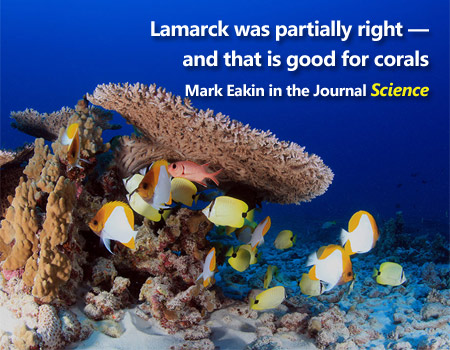
Mark Eakin of Coral Reef Watch Contributes Science Perspective on Possible Coral Adaptation to Warming Oceans11 June 2014 - In the May 23 issue of the journal Science, Mark Eakin of STAR's Coral Reef Watch was invited to contribute an article explaining the significance of a new study by Stephen R. Palumbi, "Mechanisms of reef coral resistance to future climate change". The Palumbi study is important because it demonstrates that corals have a mechanism that may allow them to genetically adapt to warmer temperatures much faster than previously known. It is still uncertain if this is a true genetic adaptation that can be passed from one generation to the next (a heritable trait), but it appears likely. Dr. Eakin's Perspectives article, "Lamarck was partially right--and that is good for corals" discusses this in light of the problem that climate change poses to corals. Whereas standard Darwinian evolution requires a long time for favorable random genetic mutations to develop and be propagated through a population, the modern field of epigenetics has demonstrated there are faster ways in which organisms can change traits and pass them on to future generations. We now know that genes are not just the sequence of nucleic acids. The structure of the genes matters as well. Gene structure is more rapidly changed in response to environmental stress and is heritable. The shape of DNA is very important in how cells operate, so a change in DNA structure can help an organism adapt to a changing environment by producing different proteins. This is the sort of change the Palumbi team has found in corals. The Perspectives piece discusses the Palumbi findings in the context of the evolutionary theories of Lamarck, whose approach was largely discredited after Darwin's discoveries were published. However, it turns out that in the realm of epigenetics (something neither Lamarck nor Darwin knew anything about), a portion of Lamarck's theories may actually be valid, as demonstrated by Palumbi's findings. Ocean temperatures have been rising rapidly and will continue to increase as humans continue to dump huge quantities of heat-trapping gases such as CO2 and methane into the atmosphere. Faster adaptation to increasing temperatures may be important to corals and other organisms as they try to survive in a rapidly warming world. |
|
